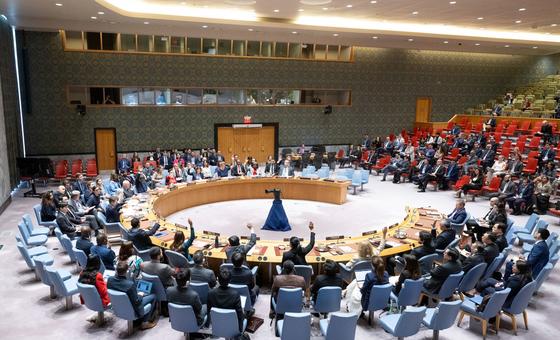The United States-drafted text calls for Hamas to accept a ceasefire proposal announced on 31 May by President Joe Biden that has already been accepted by Israel.
Adopted by a large majority with 14 votes in favour and Russia abstaining, the resolution also urges both parties to fully implement the terms of the proposal “without delay and without condition.”
President Biden described the deal as “not just a ceasefire that would inevitably be fragile and temporary” but one that would provide a “durable end to the war”.
He added that the terms of the deal had been transmitted by Qatar to the leadership of Hamas.
Three-phased approach
The motion envisages three phases to ensure a lasting and comprehensive end to the fighting.
Phase one includes an “immediate, full, and complete ceasefire with the release of hostages including women, the elderly and the wounded, the return of the remains of some hostages who have been killed, and the exchange of Palestinian prisoners”.
It calls for the withdrawal of Israeli forces from “populated areas” of Gaza, the return of Palestinians to their homes and neighbourhoods throughout the enclave, including in the north, as well as the safe and effective distribution of humanitarian assistance at scale.
Permanent end to hostilities
Phase two would see a permanent end to hostilities “in exchange for the release of all other hostages still in Gaza, and a full withdrawal of Israeli forces from Gaza”.
In phase three, “a major multi-year reconstruction plan for Gaza” would begin and the remains of any deceased hostages still in the Strip would be returned to Israel.
The Council also underlined the proposal’s provision that if negotiations take longer than six weeks for phase one, the ceasefire will continue as long as negotiations continue.
No territorial change
In the resolution, the Security Council rejects any attempt at demographic or territorial change in the Gaza Strip, including any actions that reduce the territory of the enclave.
The text also reiterates the Council’s “unwavering commitment” to the vision of the two-State solution where two democratic States, Israel and Palestine, live side by side in peace within secure and recognized borders consistent with international law and relevant UN resolutions.
“In this regard stresses the importance of unifying the Gaza Strip with the West Bank under the Palestinian Authority,” the resolution added.
Hamas must accept deal: US
The fighting could stop today if Hamas agrees to the deal now endorsed by the Security Council, said US Ambassador Linda Thomas-Greenfield.
Hamas should now see clearly that the international community is united, “united behind a deal that will save lives and help Palestinian civilians in Gaza start to rebuild and heal. United behind a deal that will reunite hostages with their families after eight months in captivity.”
Ambassador Thomas-Greenfield there was now an opportunity to chart a new course and the US will help ensure that Israel lives up to its obligations, “assuming that Hamas accepts the deal.”
Today is the fourth Security Council resolution making clear that the only way to end the cycle of violence “is through a political settlement”, she added.
Algeria: ‘Palestinian lives matter’
Algerian Ambassador Amar Bendjama said that his compatriots “deeply feel” the suffering of Palestinians and with their own history of struggle against colonial occupation, “fully understand and support” the Palestinian people’s legitimate and just demands.
“As a free and dignified people, the Palestinians will never accept living under occupation. They will never abdicate their fight for liberation,” he said.
Stressing that Algeria’s sole guiding principle has been to save Palestinian lives, he said that his country cannot remain silent in the face of collective punishment against Palestinian people.
“Palestinian lives matter,” he stressed.
He added that Algeria voted in favour of the draft because it represents a step towards an immediate and lasting ceasefire, extending his delegation’s gratitude to the US delegation and Ambassador Thomas-Greenfield.

